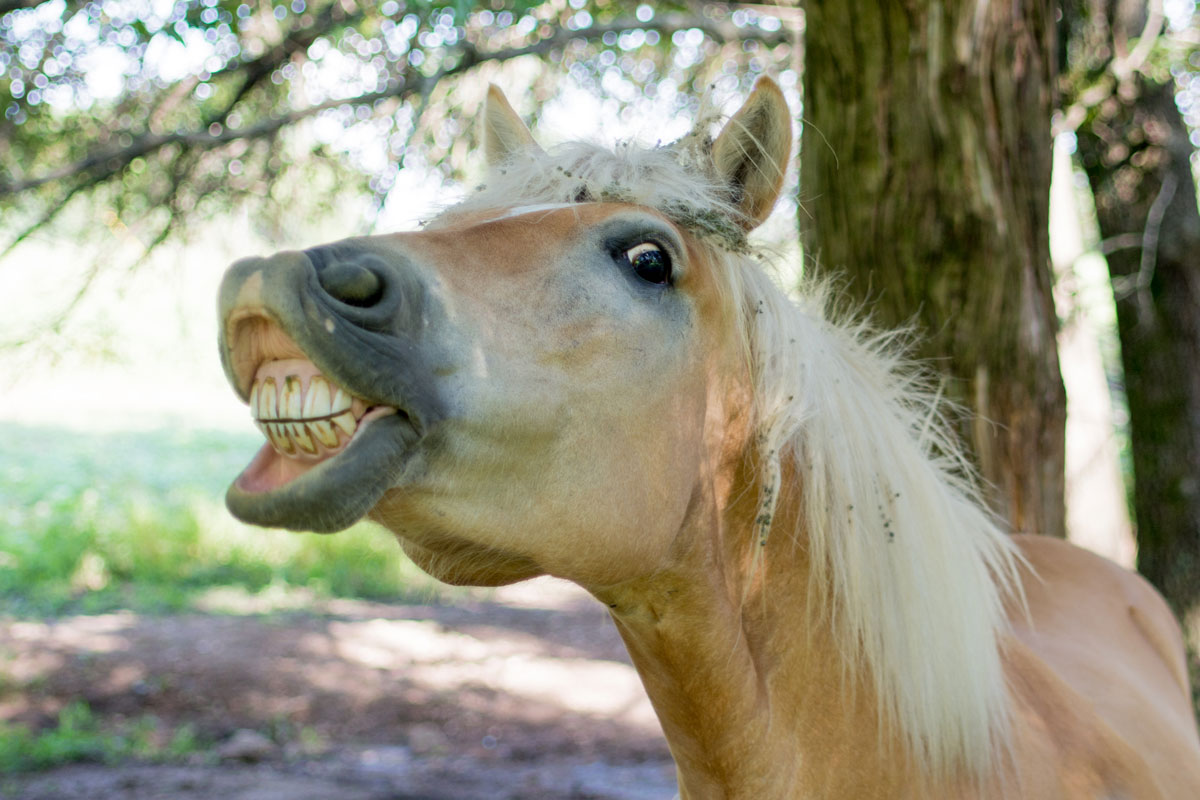
A horse’s teeth continually change as they gradually erupt from the jaw throughout the animal’s life. Front teeth become more angled with age, and molars can develop hooks and ridges. If a horse loses a tooth, the opposing tooth has nothing to wear against and “grows” abnormally into the space. Older horses might need periodic dental work to avoid problems. If horses become quite old, the worn teeth might come out completely. In some cases, you have to make sure that the horse’s feed is chopped up and already processed or softened because the horse can’t chew normally.
“Dental health is very important if you are going to help an older horse maintain body condition,” said Dr. Tia Nelson, a veterinarian who also owns horses near Helena, Montana. “The cheek teeth—the big molars and premolars on both sides of the mouth top and bottom—erupt throughout the horse’s life, as all equine teeth do.” She said the teeth gradually push out from the gum line to make up for surface wear.
“The tooth root gets shorter and shorter, and at some point the teeth start to fall out,” said Nelson. “I worked on an older horse a few months ago and the owner was concerned because the mare was starting to lose body condition and thought we might be dealing with end-of-life issues. I examined the mare, and she had a loose tooth that I could palpate easily. It was loose enough that it wasn’t difficult to take out. Within a few months that mare gained 100 pounds. With that loose tooth it hurt her to chew, so she wasn’t eating enough and was losing weight, and the food that she did chew wasn’t chewed well enough to digest adequately.”
Nelson also noted that she had a client with an older Tennessee Walker gelding “and she wanted me to put him down because he didn’t have any upper incisors; they had fallen out. But he was still fat and doing fine, so I asked that client if she might consider just giving the horse to me, and she did. I had him for 5 or 6 more years, and he did fine. We rode him, used him to drag an elk out of the mountains, and didn’t need to do anything special with him for the tooth loss. He still managed to eat enough out on pasture with the other horses.”
She also remembers one couple who decided to rescue a horse that was one of the skinniest horses Nelson had ever seen. “He was so frail and weak that a person could have almost pushed him over,” Nelson remembered. “He had no teeth, and I told those people it was really nice that they had adopted him, but putting him down would not be the wrong decision. They wanted to try to save him, however, so I told them they’d have to use a complete feed and water it down because he had no teeth.
“I told them it would be difficult in the winter because watered mash would freeze if he was slow eating it,” Nelson continued. “They still wanted to try, and they had a barn for shelter and got a water-warmer for chickens and put his pan of feed on top of that to keep it from freezing. He had no teeth, so there wasn’t much to do regarding dental care, so I just dewormed him and wished them luck. A month later I saw that horse and he was nearly 200 pounds heavier, his coat was glossy, and they were starting to ride him! No one had any idea how old he was because he had no teeth, but he looked good and they kept him going for 4 or 5 more years. It was expensive and a lot of work, but they liked him and it was worth it to them.”
Always talk to your veterinarian about dental or weight loss concerns in your horses. The solution might be as simple as removing a painful tooth or different nutritional management.


